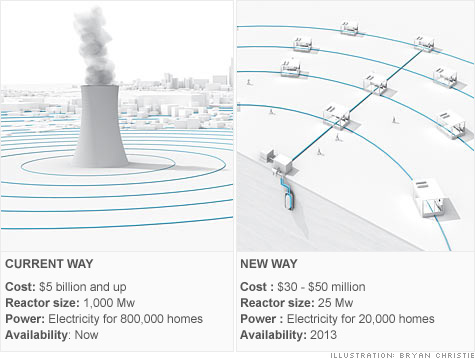
(Fortune Magazine) -- Long left for dead, the U.S. nuclear power industry appears poised for a comeback.
President Barack Obama earlier this year announced an $8.3 billion loan guarantee to help the Georgia utility Southern Co. build two large reactors, and he wants to triple the amount of federal loan guarantees for plant construction to $54 billion. Obama hopes a slew of new plants will create jobs and lots of affordable, clean electricity.
The problem: Even with the help of loan guarantees, full-scale nuclear power plants remain insanely expensive to build (conventional plants start at $5 billion, industry executives say).
Some industry players, such as Toshiba, Hyperion Power Generation, and NuScale Power, think they have a better idea: small, distributed units designed to power the equivalent of a midsize town.
Glibly nicknamed "backyard nukes," these mini power plants don't require a lot of capital, and to hear their proponents explain it, they're safe too.
Hyperion, based in Los Alamos, N.M., is developing a system utilizing technology licensed from the famed Los Alamos National Laboratory that costs from $30 million to $50 million.
Hyperion CEO John "Grizz" Deal says that the entire plant, including the reactor and protective cabinet, will be about the size of a hot tub -- eight feet tall by five feet wide -- and will be available in late 2013.
Neighborhood associations need not fret about tiny Three Mile Islands cropping up in their communities. The units are designed to be buried 15 feet or more underground. When the core needs refueling, the power company simply digs up the system and installs a new one. "It has very few moving parts, which means no operators are needed," Deal says. (Homer Simpson need not apply.)
And like its bigger brothers, Hyperion's 25-megawatt plant, designed to generate enough electricity to power 20,000 homes, doesn't emit greenhouse gases. The company says the cost to produce power is about 10¢ a kilowatt hour, slightly above the U.S. national average.
Of course, no community has yet to install one of these mini power plants, and skeptics have a host of worries. Edwin Lyman, a senior staff scientist at the Union of Concerned Scientists, argues that small plants would lack the security systems of giant commercial reactors, and thus could be targets for terrorism.
He notes that the "fast reactor" technology that mini-plants are based on has a spotty track record. "If you lose coolant, the fast reactor will melt down, and you could get an explosion," Lyman explains.
None of that deters Hyperion's Deal. But if he has a customer lined up, he isn't saying where it is located. Hyperion's ultimate target market is the developing world: "We will build them in places [where] electricity is either expensive or nonexistent," Deal says.
A noble cause, but first he has to persuade someone to let him build one. ![]()






| Company | Price | Change | % Change |
|---|---|---|---|
| Ford Motor Co | 8.29 | 0.05 | 0.61% |
| Advanced Micro Devic... | 54.59 | 0.70 | 1.30% |
| Cisco Systems Inc | 47.49 | -2.44 | -4.89% |
| General Electric Co | 13.00 | -0.16 | -1.22% |
| Kraft Heinz Co | 27.84 | -2.20 | -7.32% |
| Index | Last | Change | % Change |
|---|---|---|---|
| Dow | 32,627.97 | -234.33 | -0.71% |
| Nasdaq | 13,215.24 | 99.07 | 0.76% |
| S&P 500 | 3,913.10 | -2.36 | -0.06% |
| Treasuries | 1.73 | 0.00 | 0.12% |
|
Bankrupt toy retailer tells bankruptcy court it is looking at possibly reviving the Toys 'R' Us and Babies 'R' Us brands. More |
Land O'Lakes CEO Beth Ford charts her career path, from her first job to becoming the first openly gay CEO at a Fortune 500 company in an interview with CNN's Boss Files. More |
Honda and General Motors are creating a new generation of fully autonomous vehicles. More |
In 1998, Ntsiki Biyela won a scholarship to study wine making. Now she's about to launch her own brand. More |
Whether you hedge inflation or look for a return that outpaces inflation, here's how to prepare. More |